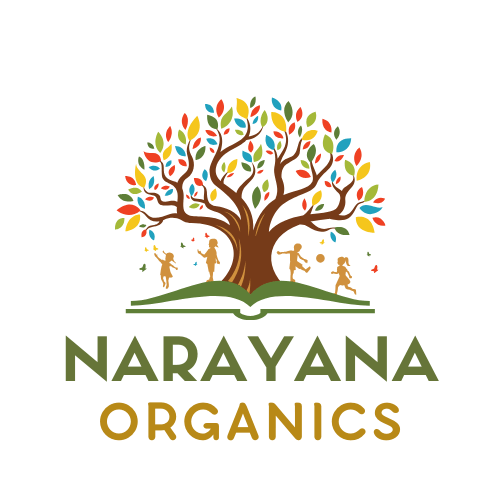Why Millennials and Gen Z Are Driving the Organic Food Revolution in 2025
Introduction: A New Generation of Conscious Eaters
In 2025, the organic food industry in India is no longer just a niche—it’s a movement. And leading this change are two generations: Millennials (born 1981–1996) and Gen Z (born 1997–2012). What sets them apart is not just their age, but their mindset. These are consumers who read labels, research brands, follow health trends, and most importantly—care about where their food comes from.
This blog explores why Millennials and Gen Z are fueling the organic food revolution, what motivates them, how brands are responding, and what this means for the future of food in India.
A Snapshot of the Shift

Over 65% of organic product buyers in urban India are under 40.
The demand for organic snacks, A2 dairy, herbal drinks, and plant-based foods has surged by 40% in the last year.
Instagram searches for “organic food near me” and “clean eating” have increased 3x since 2023.
Clearly, the younger generation is not just buying food—they’re buying into values.
Why Millennials and Gen Z Prefer Organic
 1. Health is the New Wealth
1. Health is the New Wealth
Millennials witnessed a rise in diseases like diabetes, obesity, and cancer in their families. Gen Z grew up in a pandemic-conscious world where immunity and health became top priorities.
Organic food, free of pesticides, hormones, and preservatives, is viewed as a safer, cleaner choice.
“I’d rather spend more on clean food than on hospital bills later,” says Ayushi, a 27-year-old corporate worker from Delhi.
 2. Information is Power
2. Information is Power
Both generations are digitally native. They’re not passive consumers—they Google everything. They follow health bloggers, nutritionists, and food activists. They check certifications and ingredients before buying.
Knowledge leads to skepticism—and a demand for transparency and traceability.
 3. Return to Roots
3. Return to Roots
There’s growing nostalgia and respect for traditional Indian food practices—like desi cow ghee, wood-pressed oils, millets, and fermented foods.
Organic is not just about health—it’s about culture and authenticity. Gen Z finds it “cool” to use ancient wisdom in modern ways.
 4. Planet-First Mindset
4. Planet-First Mindset
Younger Indians are more environmentally aware. They know how industrial farming contributes to:
Soil degradation
Water pollution
Climate change
Animal cruelty
Organic farming, with its eco-friendly methods, appeals to their ethical and eco-conscious lifestyle.
 5. Social Media Influence
5. Social Media Influence
Health and sustainability are now Instagrammable. Organic food is trending with hashtags like #CleanEating, #SustainableLiving, and #DesiSuperfoods.
Influencers promoting organic brands, DIY meals, and zero-waste habits shape the purchasing behavior of this audience.
What Organic Products Are They Buying?
Here’s a breakdown of what’s trending in 2025:
| Product | Why It’s Popular |
|---|---|
| A2 Cow Ghee | Linked with digestion, Ayurveda, and ethical dairy practices |
| Cold-Pressed Oils | Seen as pure and unrefined |
| Millets & Ancient Grains | Gluten-free, high-fiber, low GI—ideal for fitness-conscious |
| Organic Herbal Teas | For detox, weight loss, and stress relief |
| Nut Butters & Energy Bars | Quick, healthy snacks for busy urban lifestyles |
| Farm Fresh Subscription Boxes | Convenience + traceability + seasonal eating |
Case Studies: Real Shifts in Indian Cities
 Bangalore
Bangalore
Startups like Farmizen and Happy Hens deliver fresh, chemical-free produce directly from organic farms to city homes.
 Mumbai
Mumbai
Pop-up markets and cafes promote farm-to-table experiences. Brands like Nutriorg and Two Brothers Organic Farms have cult followings.
 Delhi NCR
Delhi NCR
The rise of wellness influencers and yoga culture is pushing demand for satvik, organic meals and subscription-based organic grocery kits.
How Brands Are Adapting
 1. Clearer Labels and Storytelling
1. Clearer Labels and Storytelling
Young consumers want to know the story behind their food—where it’s grown, who farms it, and how it’s processed. Brands are responding with:
QR codes to trace food origins
Farm visit videos
Farmer spotlights on packaging
 2. Minimal, Sustainable Packaging
2. Minimal, Sustainable Packaging
Plastic-free, biodegradable, or glass packaging is now common—because Gen Z hates plastic.
 3. Affordable Options and Subscription Models
3. Affordable Options and Subscription Models
Brands are introducing trial packs, combos, and subscription boxes to make organic more accessible to students and young professionals.
 4. Going Digital-First
4. Going Digital-First
From Instagram ads to influencer campaigns and WhatsApp shopping, brands are speaking the digital language of Millennials and Gen Z.
What This Means for the Market
This generational shift is not a fad—it’s a paradigm change. As these age groups grow older, raise families, and gain more spending power, organic food will become mainstream.
Organic is no longer for the elite. It’s for the aware.
Tips for Millennials and Gen Z to Go Organic (Without Breaking the Bank)
Start Small: Begin with high-impact items like milk, oil, and ghee.
Go Seasonal: Organic seasonal produce is cheaper and fresher.
Cook More at Home: Reduces reliance on expensive organic packaged foods.
Buy Direct: Purchase from farmers, cooperatives, or trusted brands online.
Join Community Groups: Many cities have local WhatsApp groups or farmer collectives with deals and verified sources.
Challenges They Face—and Overcome
| Challenge | How They Tackle It |
|---|---|
| Higher Prices | Buy in bulk, prioritize essentials |
| Availability | Use online platforms like BigBasket Organic, Zama Organics |
| Mistrust in Labels | Educate themselves, verify certifications |
| Social Pressure | Normalize clean eating through peer groups |
Conclusion: A Generation That Eats with Purpose
Millennials and Gen Z aren’t just changing what we eat—they’re changing why we eat it. Their choices are rooted in health, culture, ethics, and sustainability.
As they continue to influence their families, workplaces, and social circles, the ripple effect is massive. From increasing demand for clean farming to pushing brands toward greater accountability, this generation is truly leading the organic revolution from the front.
In the world of food, they’re not just consumers—they’re changemakers.
